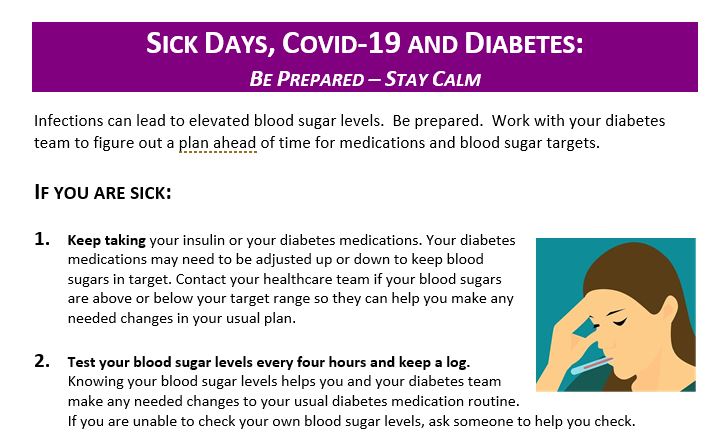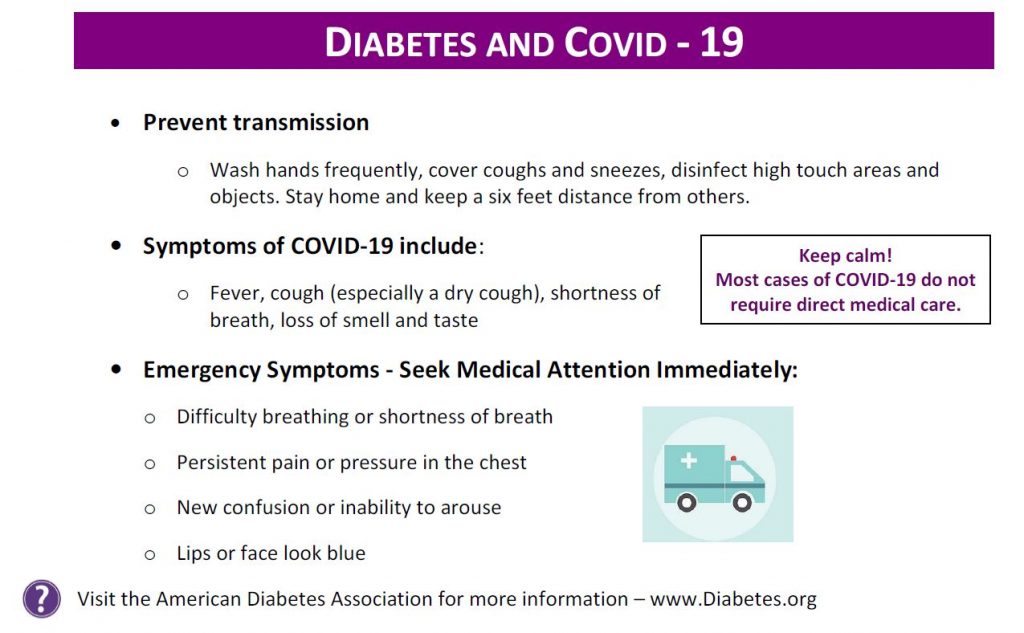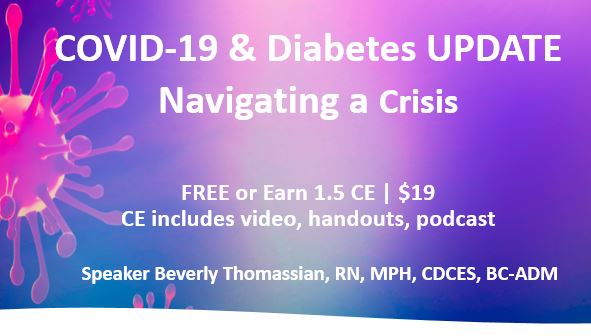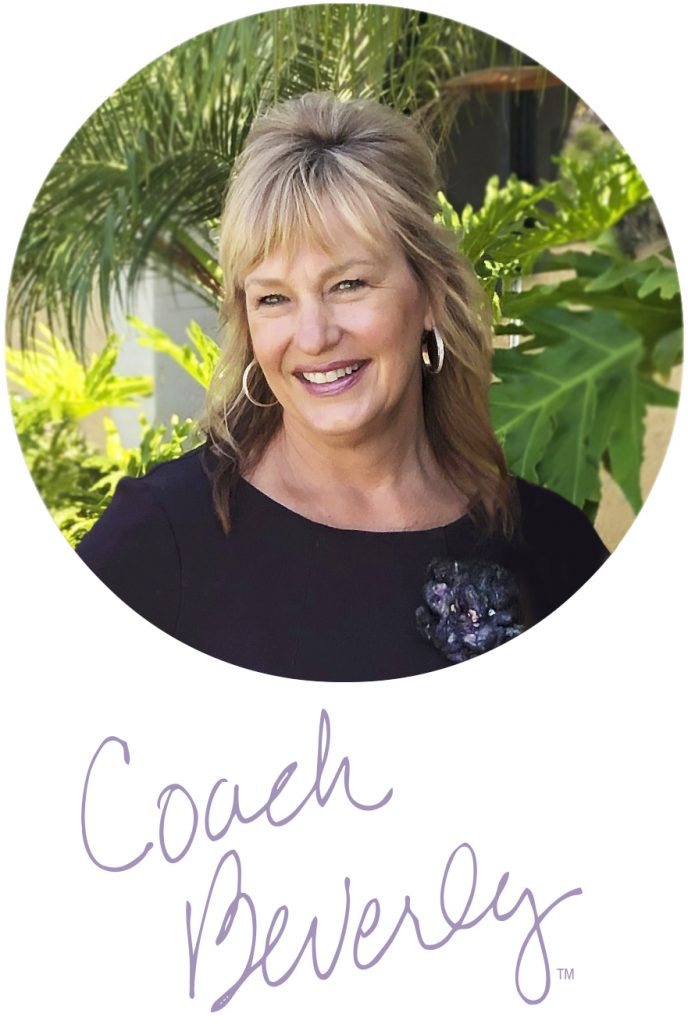COVID-19, Sick Days and Diabetes | Teaching Handout

“What do I do if I get sick or get COVID-19”?
This is a critical topic to discuss during our during telehealth visits or in-person meetings with people with diabetes. Infections, whether COVID-19 or the flu, can lead to a hyperglycemic crisis if not thoughtfully managed.
Sick Day Plans are crucial.
Free Sick Day and COVID-19 Handout
To help out, we have updated our Sick Day 2-Page handout, to include information of appropriate action in case of illness or COVID-19 infection.
Please feel free to print out or email this handout to colleagues and people living with diabetes.

Virtual Diabetes Ed Specialist Program 2020
This virtual program includes:

10 two-hour live webinar courses (20 CEs) + enrollment in our Bonus Bundle (14.6 + CEs) from now through December 31st, 2020.
- Live Q & A Session with the instructor after each webinar
- Presentations by our team of experts
- Handouts and Resources for each session
- Post-test questions
- A sense of community
- If you can’t attend the live webinars, a recorded version will be posted later the same day for viewing
- Click here for more info on our Virtual Diabetes Ed Specialist Program
Question of the Week | March 31, 2020

JR is 27 with Type 1 diabetes and is very worried about getting COVID-19 since they work in a local grocery store. They ask you what they should do if they get COVID-19?
Which of the following statements is accurate regarding sick day management with COVID-19?
- Seek immediate medical attention if lips or face become bluish
- Report to the emergency room if temperature is 101 degrees or greater
- Reduce insulin intake by 10-20% if experiencing diarrhea
- Use glucose fingersticks instead of continuous glucose monitoring when febrile to improve accuracy.
Click here to test your knowledge!
Sign up for Diabetes Blog Bytes – we post one daily Blog Byte from Monday to Friday. And of course, Tuesday is our Question of the Week. It’s Informative and FREE! Sign up below!
[yikes-mailchimp form=”1″]Mindful Monday | Wisdom on Slowing Down
Dearest community,
I miss hanging out with you. But now is a time to be present with ourselves. This weekend, I considered finding my crochet hooks and making an afghan. I finished 2 books, made banana bread, mashed potatoes and put old books in a donate box. Our family has played dozens of games of Rook, even though our two teenage boys consistently outwit me and my husband.
I have found myself slowing down and observing more. I discovered two new birds nest during my daily walk. I paused to watch a curious quail poke its head into my succulents. I have delighted in the night time calls of the geese as they head home.
Last week, a narration appeared in my Facebook feed that I have kept going back to. The message has afforded me comfort and guidance during this time of reflection. I hope it resonates with you and I thank the Council of 13 Indigenous Grandmothers for sharing their wisdom.
A message from the Council of 13 Indigenous Grandmothers:
“As you move through these changing times… be easy on yourself and be easy on one another.
You are at the beginning of something new. You are learning a new way of being. You will find that you are working less in the yang modes that you are used to.
You will stop working so hard at getting from point A to point B the way you have in the past, but instead, will spend more time experiencing yourself in the whole, and your place in it.

Instead of traveling to a goal out there, you will voyage deeper into yourself. Your mother’s grandmother knew how to do this.
Your ancestors from long ago knew how to do this. They knew the power of the feminine principle… and because you carry their DNA in your body, this wisdom and this way of being is within you.
Call on it. Call it up. Invite your ancestors in.
As the yang based habits and the decaying institutions on our planet begin to crumble, look up. A breeze is stirring.
Feel the sun on your wings.”
Read more at the Council of 13 Indigenous Grandmothers:
Sign up for Diabetes Blog Bytes – we post one daily Blog Byte from Monday to Friday. And of course, Tuesday is our Question of the Week. It’s Informative and FREE! Sign up below!
[yikes-mailchimp form=”1″]
Question of the Week | March 24, 2020

MJ, a 49-year-old with type 1 diabetes, states during your telehealth session that they are not feeling very well and are worried about getting COVID-19.
Which of the following is an accurate statement?
- People with diabetes are at higher risk of getting COVID-19
- People with diabetes have the same risk of getting COVID-19 as the general population
- People with type 1 diabetes have a slightly higher risk of getting COVID-19 than those with type 2 diabetes
- Regardless of the type of diabetes, COVID-19 rates are slightly lower
Click here to test your knowledge!

COVID & Diabetes Update
Navigating a Crisis
Recorded & Ready for Viewing
Coach Beverly Thomassian, RN, MPH, CDCES, BC-ADM, has completely updated this critical presentation, to bring health care professionals up-to-date on the current state of COVID and its impact on diabetes care. She summarizes key information including critical teaching points and management strategies for people with diabetes who develop a COVID-19 infection.
Topics Include:
- Discuss the current state of diabetes in the United States.
- Describe the relationship between COVID and health care disparities
- Explore the impact of COVID infection on those with pre-existing diabetes.
- Discuss treatment strategies for COVID and diabetes, including new vaccines.
- List critical teaching points for people with diabetes and COVID.
Join us to learn critical information about Diabetes and COVID Management

Instructor: Beverly Thomassian RN, MPH, CDCES, has been Board Certified in Advanced Diabetes Management for over 20 years. She is an Associate Clinical Professor at UCSF and Touro University and a nationally recognized diabetes expert.
Sign up for Diabetes Blog Bytes – we post one daily Blog Byte from Monday to Friday. And of course, Tuesday is our Question of the Week. It’s Informative and FREE! Sign up below!
[yikes-mailchimp form=”1″]
Accreditation: Diabetes Education Services is an approved provider by the California Board of Registered Nursing, Provider 12640, and Commission on Dietetic Registration (CDR), Provider DI002. Since these programs are approved by the CDR it satisfies the CE requirements for the CDCES regardless of your profession.*
The use of DES products does not guarantee the successful passage of the CDCES exam. CBDCE does not endorse any preparatory or review materials for the CDCES exam, except for those published by CBDCE.
Mindful Monday | “I Worried”, a Poem by Mary Oliver

Mary Jane Oliver was an American poet who won the National Book Award and the Pulitzer Prize.
Her wisdom and candor offers readers the opportunity to see the world as it is and then slightly adjust their gaze to see the potential for hope and healing.
In this time of uncertainty, we can look to poetry, art and music to provide comfort, wisdom and a little beauty. We hope you enjoy this poem that Coach Beverly has chosen to share.
I WORRIED
I worried a lot. Will the garden grow, will the rivers
flow in the right direction, will the earth turn
as it was taught, and if not, how shall I correct it?
Was I right, was I wrong, will I be forgiven,
can I do better?
Will I ever be able to sing, even the sparrows
can do it and I am, well,
hopeless.
Is my eyesight fading or am I just imagining it,
am I going to get rheumatism,
lockjaw, dementia?
Finally I saw that worrying had come to nothing.
And gave it up. And took my old body
and went out into the morning,
and sang.
By Mary Jane Oliver, (September 10, 1935 – January 17, 2019) From Swan, 2010
Also read our blog 10 Mental Health Strategies while we Shelter-in-Place
Sign up for Diabetes Blog Bytes – we post one daily Blog Byte from Monday to Friday. And of course, Tuesday is our Question of the Week. It’s Informative and FREE! Sign up below!
[yikes-mailchimp form=”1″]
10 Mental Health Strategies While We “Stay at Home”

As we enter this unprecedented phase of the pandemic, how do we as individuals and parents cope? Dr. Giuseppe (Bepi) Raviola serves as the director of the global mental health team at Partners In Health. To help us through this difficult and scary time, he has outlined mental health strategies to help us adapt and cope while we engage in social distancing and upheaval of our daily lives.
We highlight several practices that might help us gain steady emotional footing in this strange new scenario that we are suddenly together in. Coach Beverly has also incorporated a few of her own suggestions.
10 Practices
- Social distancing doesn’t mean emotional distancing. Find ways to keep connected with your important people. Use technologies such as skyping, facetime and others to keep in touch. Write those thank you cards you have been meaning to send or write a letter to a special person in your life.
- Create a schedule for your day and try to develop a routine if you are staying home. Make sure to include outdoor activities, time for mindfulness and connecting with others.
- Carve out time for physical activity. Try to stretch daily and breathe deeply. There are lots of dance instruction and yoga classes online for free. Maybe you want to try a new type of exercise that you can find online. Take a walk outside while talking to friends on the phone. National Parks are not charging admission fees to encourage people to enjoy nature.
- Try to limit internet time reading about COVID-19. Instead, consider this is a time for learning and intellectual engagement. Start learning that new language, read a book on a topic you are not familiar with, take online courses for continuing education. Dust off your guitar or piano or other instruments and take online lessons.
- Positive family time can help counter feelings of fear. Play games together, sing karaoke, work on outside projects, cook meals, or just hang out in a shared space.
- Remember to do the things that you really enjoy doing, that you can do in this situation.
- Reach out to neighbors that need help getting food and basic necessities. Look for ways to volunteer in your community.
- Take time for focused meditation and relaxation. We have a wonderful and free Mindfulness Practice for Health Care Professionals that you may want to explore.
- Limit exposure to TV and internet news. Choose small windows and then find ways to cleanse yourself of it.
- Bathe daily, if possible, to reinforce feelings of cleanliness. Take a bath in mineral salts, light candles, listen to soothing music.
Read more here.
Remember that we will get through this. We are resilient, smart and resourceful.
With love, Coach Beverly.
Sign up for Diabetes Blog Bytes – we post one daily Blog Byte from Monday to Friday. And of course, Tuesday is our Question of the Week. It’s Informative and FREE! Sign up below!
[yikes-mailchimp form=”1″]








